
Journal Menu
► ▼ Journal Menu-
- Forests Home
- Aims & Scope
- Editorial Board
- Reviewer Board
- Topical Advisory Panel
- Instructions for Authors
- Special Issues
- Topics
- Sections & Collections
- Article Processing Charge
- Indexing & Archiving
- Editor’s Choice Articles
- Most Cited & Viewed
- Journal Statistics
- Journal History
- Journal Awards
- Conferences
- Editorial Office
Journal Browser
► ▼ Journal BrowserNeed Help?
Announcements
24 April 2024
Forests | Invitation to Read Editor’s Choice Articles Selected from Volume 15, Issues 1–3
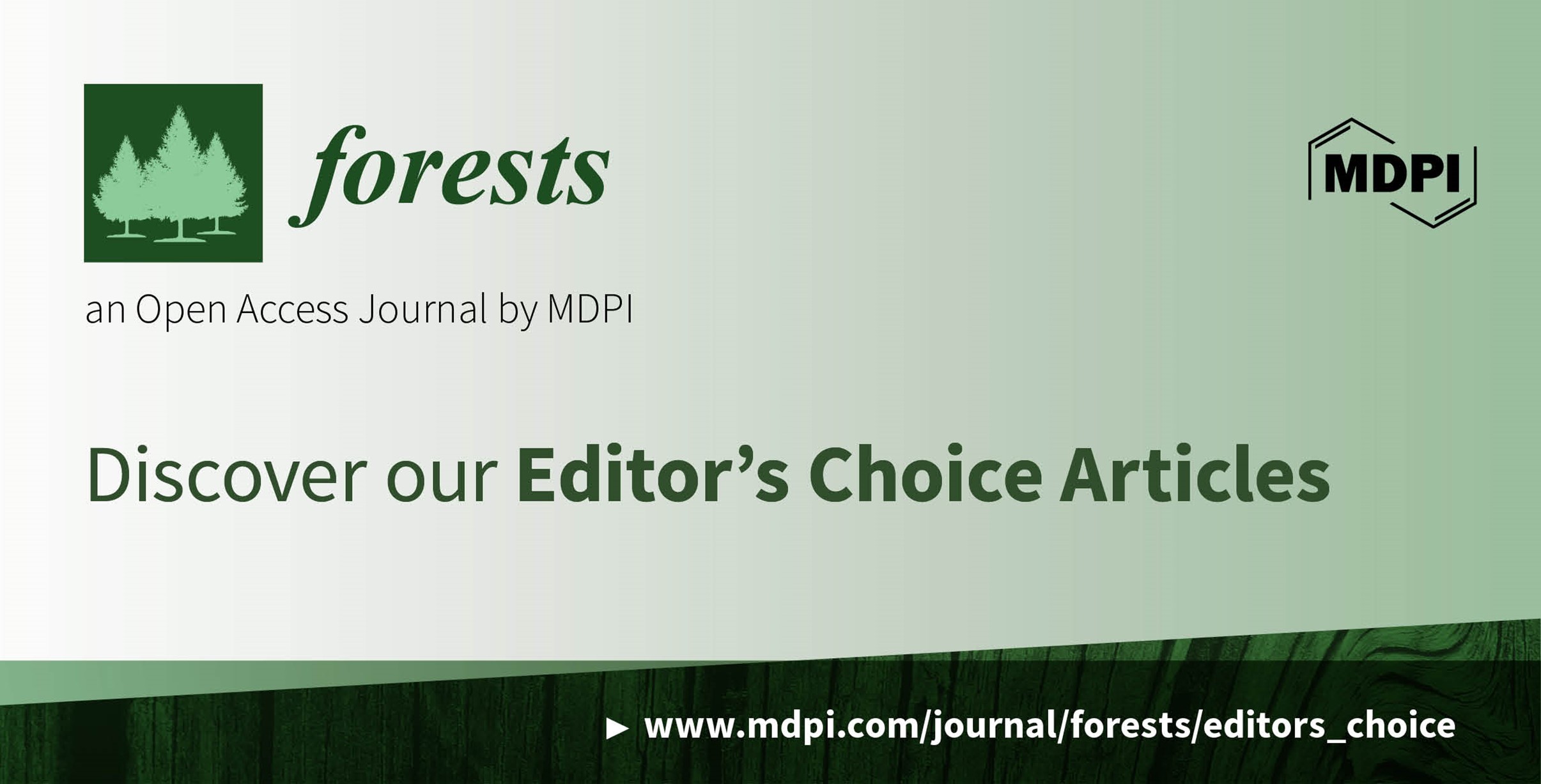
We are pleased to share the following ten Editor's Choice Articles published in Forests (ISSN: 1999-4907). These papers were selected by our Editors-in-Chief from the most notable papers published in Volume 15, Issues 1‒3. All these papers are of particular interest or importance to readers and have been well received by researchers.
1. “Effects of Climate Change on Scots Pine (Pinus sylvestris L.) Growth across Europe: Decrease of Tree-Ring Fluctuation and Amplification of Climate Stress”
by Jakub Brichta, Václav Šimůnek, Lukáš Bílek, Zdeněk Vacek, Josef Gallo, Stanisław Drozdowski, José Alfredo Bravo-Fernández, Bill Mason, Sonia Roig Gomez, Vojtěch Hájek et al.
Forests 2024, 15(1), 91; https://doi.org/10.3390/f15010091
Available online: https://www.mdpi.com/1999-4907/15/1/91
2. “Spruce Protection against Ips typographus with Anti-Attractant Blend of Tree-Based Semiochemicals: From Small Experimental Plots to Stand Scales”
by Rastislav Jakuš, Aleksei Trubin, Vivek Vikram Singh, Khodabakhsh Zabihi, Anna Jirošová, Roman Modlinger, Andrej Majdák, Nataliya Korolyova, Antonioni Acacio Campos Moliterno, Jaroslav Kašpar et al.
Forests 2024, 15(2), 356; https://doi.org/10.3390/f15020356
Available online: https://www.mdpi.com/1999-4907/15/2/356
3. “Due Diligence for Deforestation-Free Supply Chains with Copernicus Sentinel-2 Imagery and Machine Learning”
by Ivan Reading, Konstantina Bika, Toby Drakesmith, Chris McNeill, Sarah Cheesbrough, Justin Byrne and Heiko Balzter
Forests 2024, 15(4), 617; https://doi.org/10.3390/f15040617
Available online: https://www.mdpi.com/1999-4907/15/4/617
4. “Nature-Based Tourism in National and Natural Parks in Europe: A Systematic Review”
by Delia S. Donici and Diana E. Dumitras
Forests 2024, 15(4), 588; https://doi.org/10.3390/f15040588
Available online: https://www.mdpi.com/1999-4907/15/4/588
5. “Economic Profitability of Carbon Sequestration of Fine-Aroma Cacao Agroforestry Systems in Amazonas, Peru”
by Malluri Goñas, Nilton B. Rojas-Briceño, Darwin Gómez Fernández, Daniel Iliquín Trigoso, Nilton Atalaya Marin, Verónica Cajas Bravo, Jorge R. Díaz-Valderrama, Jorge L. Maicelo-Quintana and Manuel Oliva-Cruz
Forests 2024, 15(3), 500; https://doi.org/10.3390/f15030500
Available online: https://www.mdpi.com/1999-4907/15/3/500
6. “Unearthing Current Knowledge Gaps in Our Understanding of Tree Stability: Review and Bibliometric Analysis”
by Emmanuel Chukwudi Ekeoma, Mark Sterling, Nicole Metje, John Spink, Niall Farrelly and Owen Fenton
Forests 2024, 15(3), 513; https://doi.org/10.3390/f15030513
Available online: https://www.mdpi.com/1999-4907/15/3/513
7. “Characterization of Change in Tree Cover State and Condition over the Conterminous United States”
by Francis K. Dwomoh and Roger F. Auch
Forests 2024, 15(3), 470; https://doi.org/10.3390/f15030470
Available online: https://www.mdpi.com/1999-4907/15/3/470
8. “Potential Distribution Projections for Senegalia senegal (L.) Britton under Climate Change Scenarios”
by Jiaqi Fang, Jianfei Shi, Ping Zhang, Minghao Shao, Na Zhou, Yongdong Wang and Xinwen Xu
Forests 2024, 15(2), 379; https://doi.org/10.3390/f15020379
Available online: https://www.mdpi.com/1999-4907/15/2/379
9. “Driving Efficiency and Competitiveness: Trends and Innovations in ERP Systems for the Wood Industry”
by Karla Vukman, Kristina Klarić, Krešimir Greger and Ivana Perić
Forests 2024, 15(2), 230; https://doi.org/10.3390/f15020230
Available online: https://www.mdpi.com/1999-4907/15/2/230
10. “Three Censuses of a Mapped Plot in Coastal California Mixed-Evergreen and Redwood Forest”
by Gregory S. Gilbert, Sarah G. Carvill, Alexander R. Krohn and Alexander S. Jones
Forests 2024, 15(1), 164; https://doi.org/10.3390/f15010164
Available online: https://www.mdpi.com/1999-4907/15/1/164
We would like to thank all the research groups behind these exceptional papers for their contribution to Forests. We would greatly appreciate it if you would circulate this document among your colleagues or through your network.
If you want to learn more about the contributions published in Editor’s Choice Articles, please click here.
17 April 2024
Recruiting Editorial Board Members for Forests
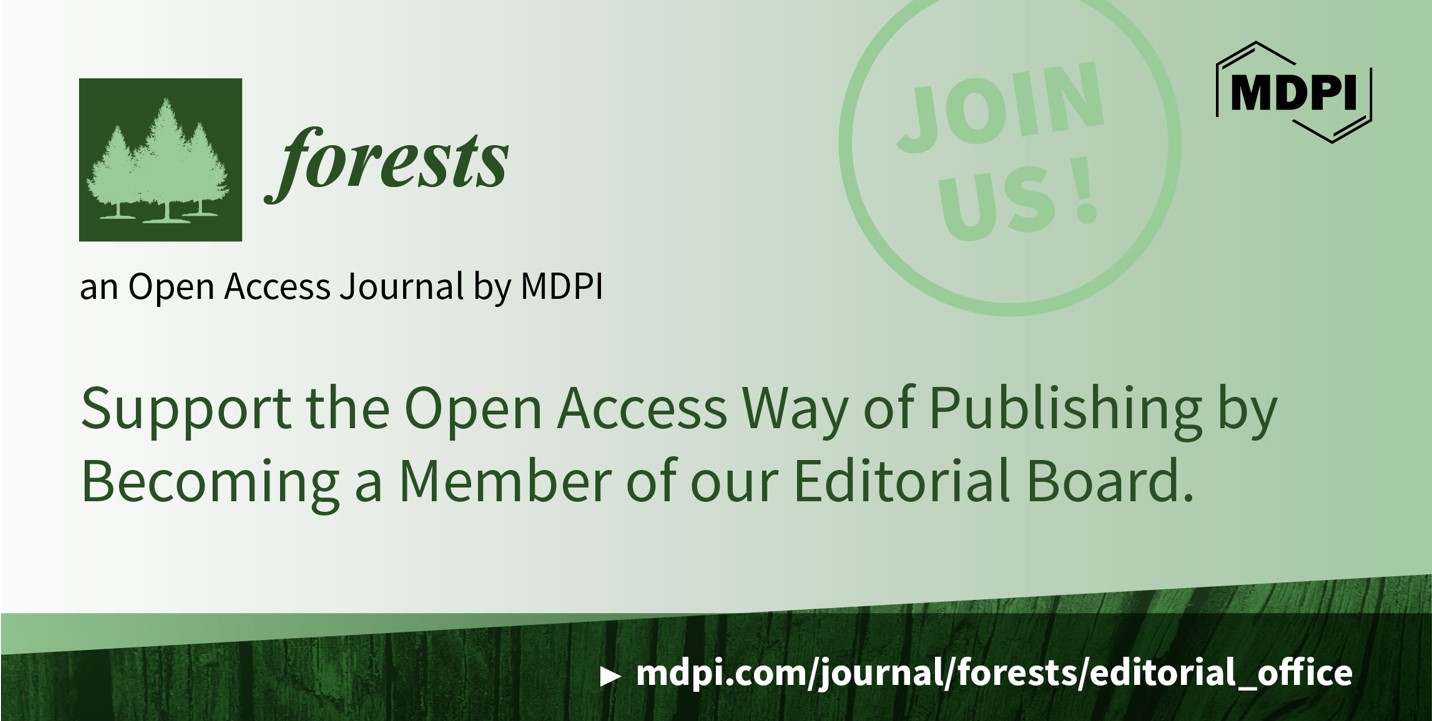
Forests (ISSN: 1999-4907) is an international, peer-reviewed, open access journal on forestry and forest ecology published monthly online by MDPI. To expand our contribution to forestry research, Forests is recruiting researchers to join our Editorial Boards of the following Sections:
- “Forest Economics, Policy, and Social Science”;
- “Forest Operations and Engineering”;
- “Natural Hazards and Risk Management”;
- “Urban Forestry”;
- “Forest Hydrology”.
The primary responsibilities of Editorial Board Members include the following:
- Pre-screening and making decisions on new submissions related to their research interests;
- Leading a Special Issue related to their research interests (or participating as co-Guest Editor in Special Issues related to their research field) when available;
- Providing input or feedback regarding journal policies;
- Helping to promote the journal among their peers or at conferences;
- Attending Board meetings to suggest journal development strategies;
- Reviewing manuscripts in their area of interest when available.
The benefits of being an Editorial Board Member include the following:
- Publication of one paper free of charge per year in Forests and potential discounts for additional papers that they invite;
- A recognition certificate as an Editorial Board Member of Forests;
- Additional sponsorships for conferences organized by Editorial Board Members;
- The opportunity to take advantage of the website or the Board to announce conferences (which Forests can sponsor) and disseminate news, position openings, or any message useful to the scientific community.
The requirements for applying to the Editorial Board Member position include the following:
- Enthusiasm for journal work and being able to assume the responsibilities required of Editorial Board Members;
- Those with experience as a Special Issue Guest Editor or reviewer will receive priority.
If you are interested in becoming an Editorial Board Member of Forests, please send your full academic CV and a short cover letter that shows your interest and enthusiasm for the position to the Forests Editorial Office. We look forward to working with you in the future.
7 April 2024
Forests | Interview with Dr. Zhichao Lou, the Committee Member of the 4th International Electronic Conference on Forests
1. Could you introduce your current research focus and provide an update on your progress?
Nowadays, my group is focused on solving the key scientific and technological problems in the development and industrialization of bamboo-based green, environment-friendly and sustainable building materials under the support of the National Key R&D Program of China (‘Research on key technology development and industrialization demonstration of high-strength bamboo-based structural materials based on innovative synergy of unit and adhesive’).
Through this project, a key technical system along with a full set of corresponding parameters for producing flattened bamboo board-based structural materials should be established, including a novel technology for saturated steam softening and floating crack-free flattening of bamboo, a novel type of environment-friendly adhesive with high wettability which is suitable for assembly, lengthening, hot-pressing and gluing of flattened bamboo boards, and the corresponding innovative bamboo lengthening and assembly methods. The environmental impact and carbon footprint analysis model and method of material creation process based on life cycle assessment will be developed to guide the extensive application of bamboo-based structural materials in green and environment-friendly buildings.
2. Have you encountered any challenges in your research? How did you overcome them? Could you share your experience?
My Ph.D. major is materials physics and chemistry, not forest engineering. The corresponding thesis is on the application research of inorganic materials in biosensors. Thus, when I began investigating bamboo processing, I was not a professional. This was the biggest challenge when I began working at Nanjing Forestry University. However, I have found that joining a professional team and receiving guidance from industry experts was a shortcut for me to overcome the challenges caused by disciplinary differences and achieve rapid improvement. Since 2018, I have been engaged in research related to bamboo processing and modification, bamboo flattening, and bamboo restructuring under the leadership of Professor Li Yanjun, a national leading talent in the field of bamboo in China. Under Professor Li's guidance, I have gradually improved my overall understanding of bamboo and wood materials.
3. Looking ahead, what do you believe will be the hot topics in the field of forest research in the next few years? Please share the topics and your reasoning.
In my opinion, bamboo processing and design of bamboo-based structural materials with the advantage of being green, environment-friendly and high-strength should be the hot topics in the field of forest research in the next few years.
As we know, bamboo has the natural carbon fixation ability. Being that they store carbon, bamboo buildings have obvious advantages and environmental benefits. Their important role in energy saving and emission reduction is increasingly noted by society. Compared with steel and concrete materials, bamboo building material has a lower carbon emission factor, so the carbon emission is low during construction, use and demolition stages. Promoting the development of bamboo structures and buildings according to local conditions is of great practical significance in reducing energy consumption and carbon emissions. However, the development of bamboo structure buildings is slow, which is due to a couple of factors: 1) Natural bamboo is difficult to be used directly as a structural material in high-rise buildings. The traditional sheet processing method greatly damaged the natural structure of bamboo, resulting in large amounts of glue, high cost, and low physical and mechanical properties; 2) The fluidity, wettability and permeability of traditional adhesives in bamboo are not good, resulting in poor bonding performance, and the extensive use of phenolic resin has adverse effects on the environment.
4. As a member of the IECF 2024 committee, could you briefly describe what kind of meeting you are hoping for?
I am looking forward to the meeting in which ground-breaking ideas from experts and young researchers in the field of forests can be shared. I hope that this meeting can provide a unique opportunity to connect with the brightest minds in the field, engage in discussions to shape new strategies and influence the future of forests.
5. With numerous conferences being organized each year, do you have any suggestions for making our conference more meaningful for scholars and students?
1) Develop professional themes; 2) strictly control the submitted abstracts, and 3) invite more well-known authoritative experts to share their research results and wisdom with everyone.
6. Could you share some of your past conference experiences? Did these conferences assist you in promoting your research results, expanding your network, finding potential collaborators, or advancing your career, etc.?
The most impressive international conference experience has been attending the SWST (Society of Wood Science and Technology) conference over the years. During these conferences, authoritative experts and renowned scholars in the field of wood science and technology from around the world were gathered. The conference set up a variety of themes and carried out various exchange activities. Everyone exchanged the latest research results during the conference, generating many meaningful research ideas.
7. What are your thoughts on the current trends and developments of open access publishing?
Open access for publishing papers can facilitate faster and wider dissemination of one's research findings. However, as an open access journal publisher, it is necessary to establish stricter standards and management in many aspects such as manuscript selection, solicitation, and review.
For more information about the 4th International Electronic Conference on Forests, please visit the following website: https://sciforum.net/event/IECF2024.
5 April 2024
Forests | Top Cited Papers with Excellent Graphical Abstracts in 2022
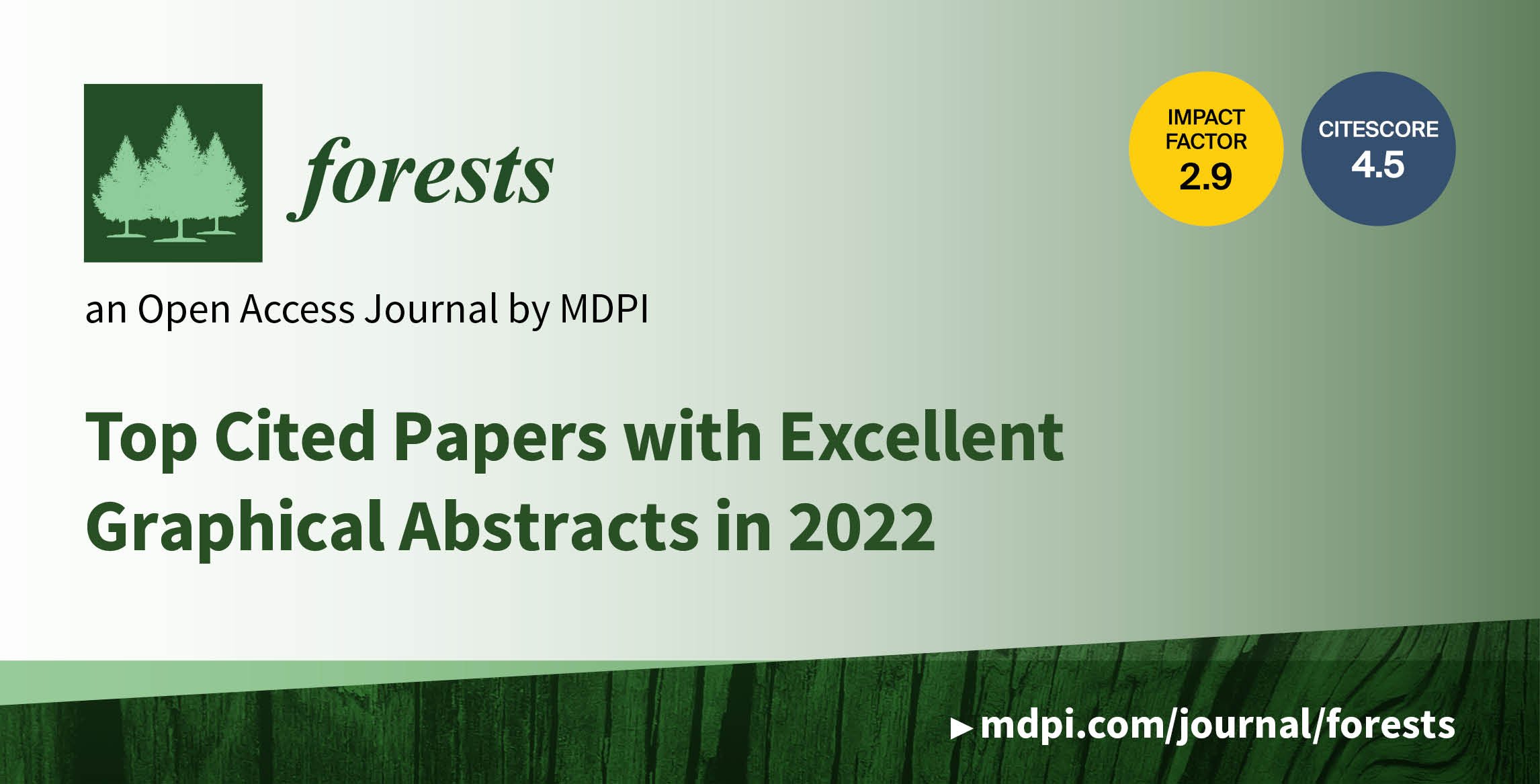
We are pleased to share the following 10 top cited papers with excellent graphical abstracts published in Forests (ISSN: 1999-4907). These papers were selected based on the highest number of citations and excellent graphical abstracts published in 2022. All of these papers are of particular interest or importance to our readers, and all have been well received by researchers. Please note that the number of downloads, abstract views and citations of articles was calculated on 6 March 2024.
1. “Twelve Years into Genomic Selection in Forest Trees: Climbing the Slope of Enlightenment of Marker Assisted Tree Breeding”
by Dario Grattapaglia
Forests 2022, 13(10), 1554; https://doi.org/10.3390/f13101554
Available online: https://www.mdpi.com/1999-4907/13/10/1554
Views: 4594; Abstract views: 3921; Citations: 21
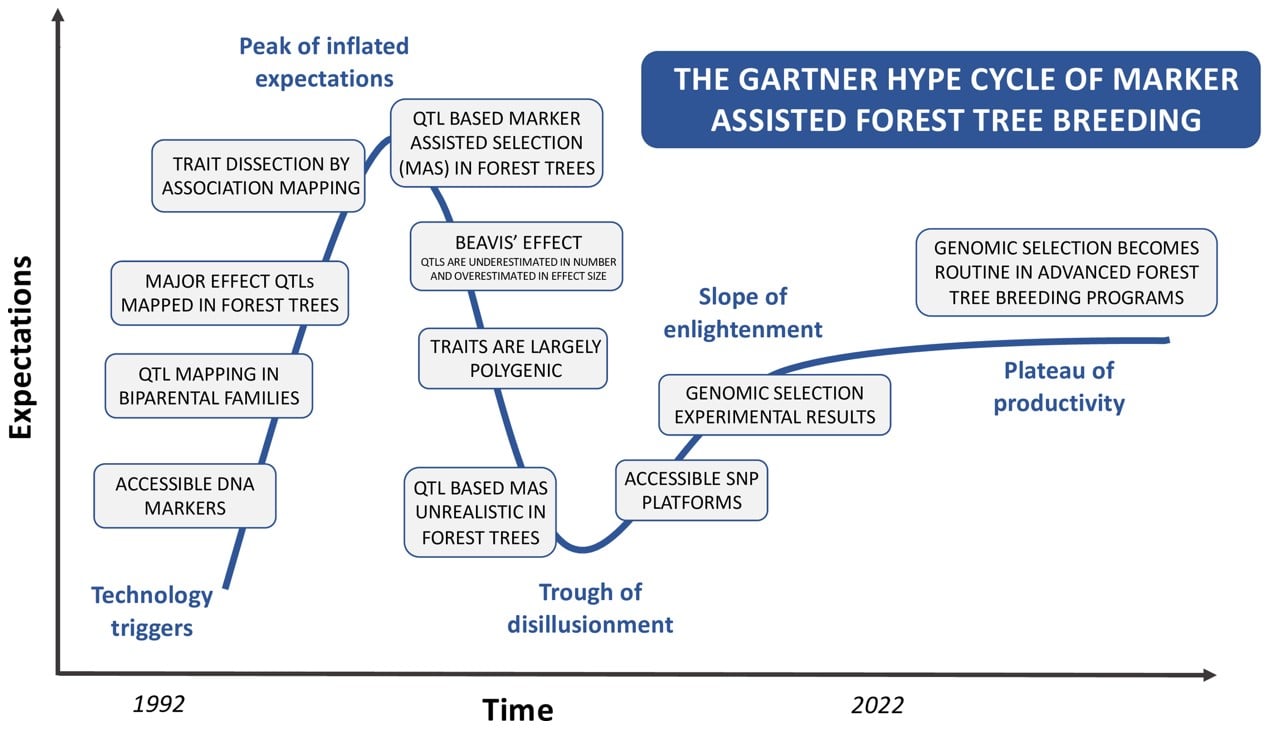
2. “Warming Responses of Leaf Morphology Are Highly Variable among Tropical Tree Species”
by Aloysie Manishimwe, Bonaventure Ntirugulirwa, Etienne Zibera, Brigitte Nyirambangutse, Myriam Mujawamariya, Mirindi E. Dusenge, Elias Bizuru, Donat Nsabimana, Johan Uddling and Göran Wallin
Forests 2022, 13(2), 219; https://doi.org/10.3390/f13020219
Available online: https://www.mdpi.com/1999-4907/13/2/219
Views: 3306; Abstract views: 2959; Citations: 11
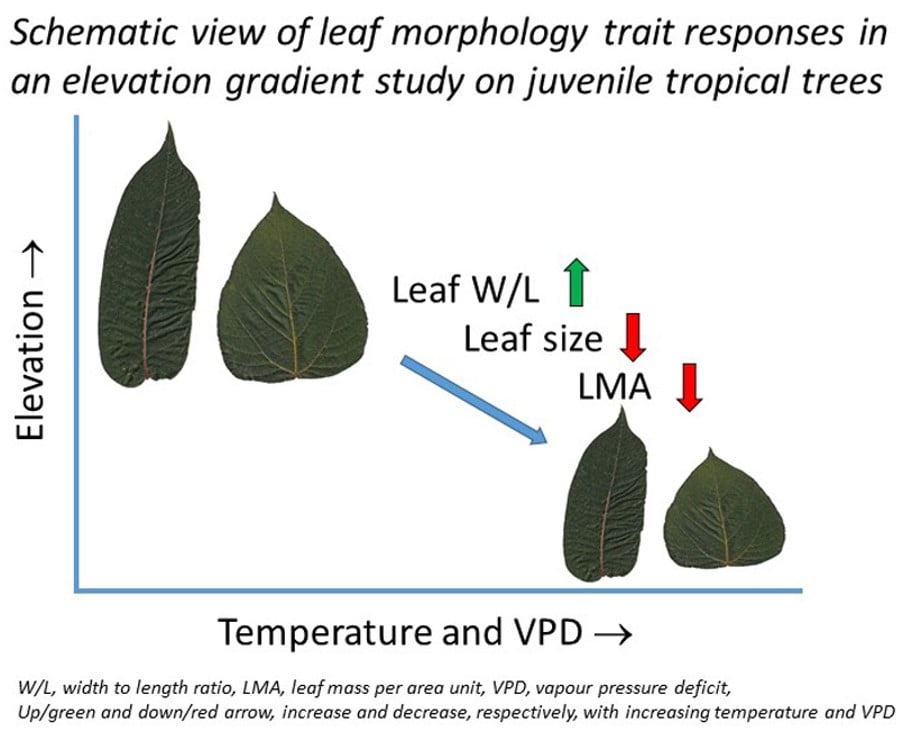
3. “Water in Wood: A Review of Current Understanding and Knowledge Gaps”
by Emil Engelund Thybring, Maria Fredriksson, Samuel L. Zelinka and Samuel V. Glass
Forests 2022, 13(12), 2051; https://doi.org/10.3390/f13122051
Available online: https://www.mdpi.com/1999-4907/13/12/2051
Views: 9211; Abstract views: 8218; Citations: 9
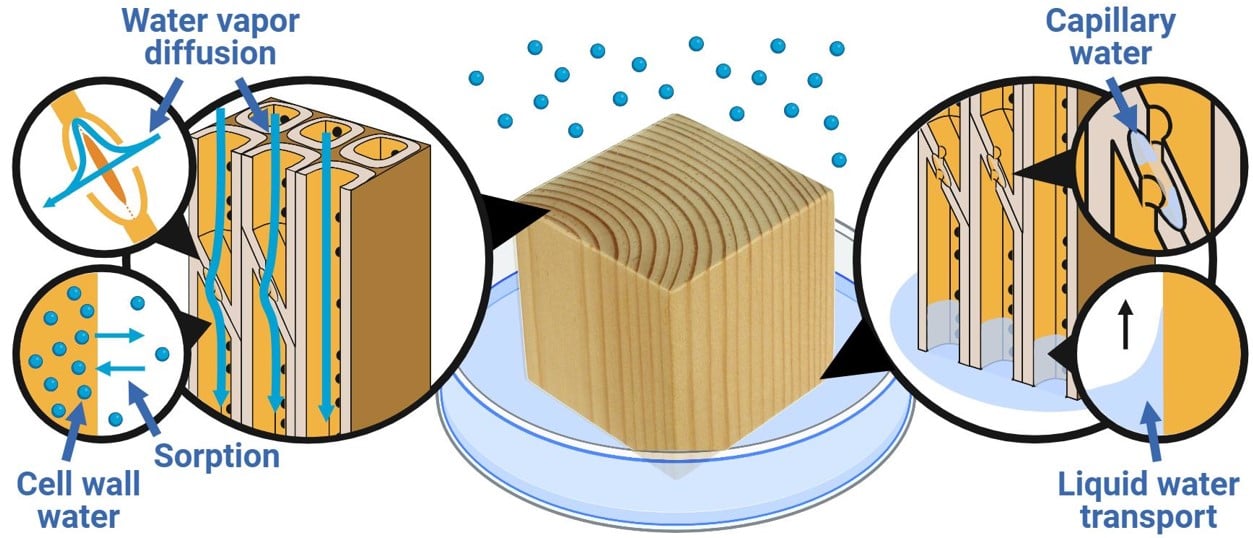
4. “Oak Decline Caused by Biotic and Abiotic Factors in Central Europe: A Case Study from the Czech Republic”
by Markéta Macháčová, Oto Nakládal, Michal Samek, Daniel Baťa, Václav Zumr and Vítězslava Pešková
Forests 2022, 13(8), 1223; https://doi.org/10.3390/f13081223
Available online: https://www.mdpi.com/1999-4907/13/8/1223
Views: 2386; Abstract views: 1959; Citations: 9
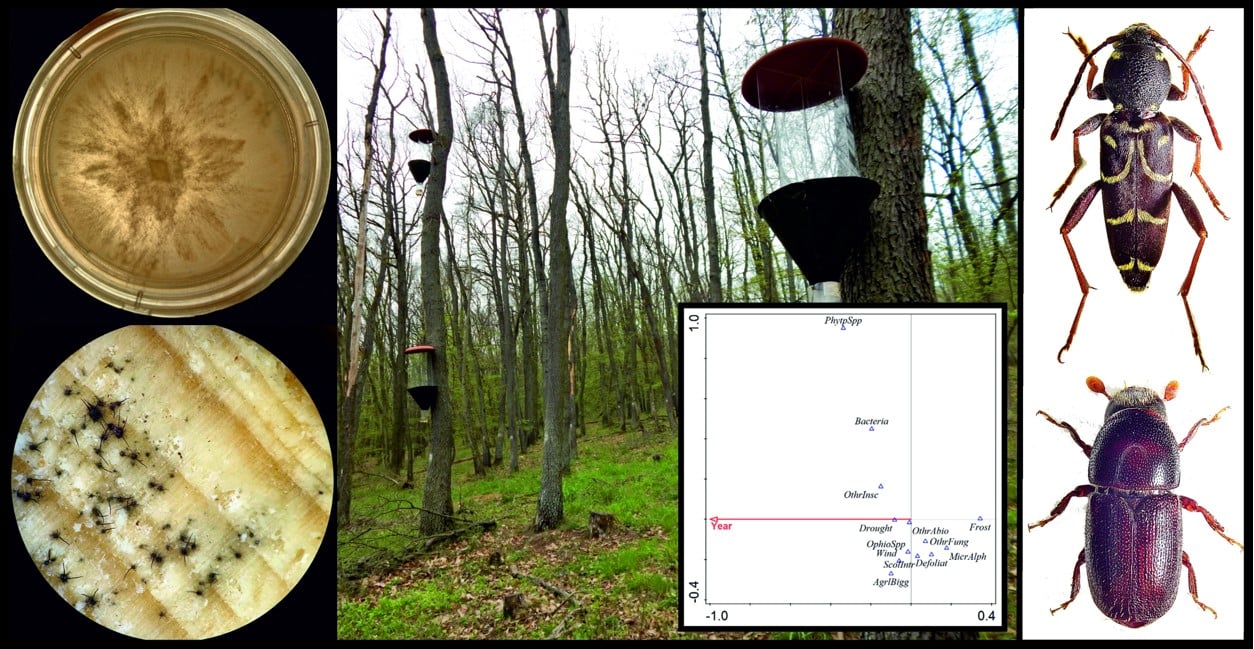
5. “Importance of Dead Wood in Virgin Forest Ecosystem Functioning in Southern Carpathians”
by Șerban Chivulescu, Diana Pitar, Bogdan Apostol, Ștefan Leca and Ovidiu Badea
Forests 2022, 13(3), 409; https://doi.org/10.3390/f13030409
Available online: https://www.mdpi.com/1999-4907/13/3/409
Views: 2241; Abstract views: 1690; Citations: 9
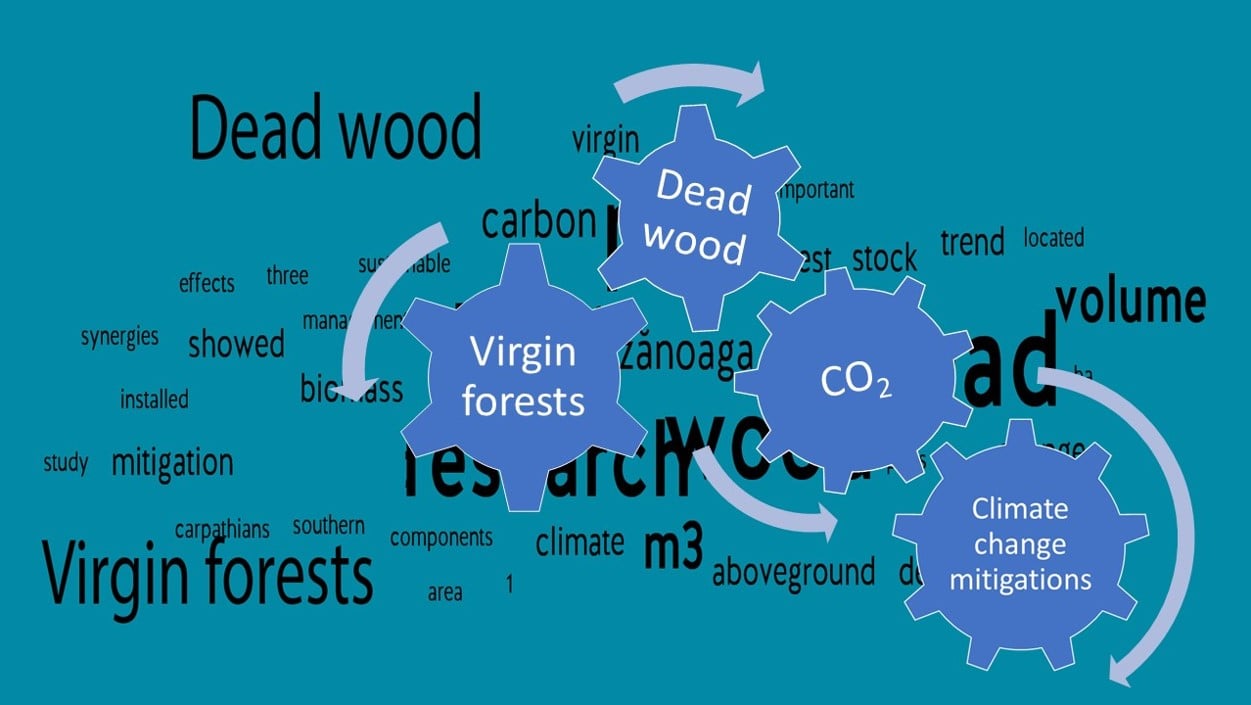
6. “Human Health and Outdoor Adventure Recreation: Perceived Health Outcomes”
by Ryan Zwart and Alan Ewert
Forests 2022, 13(6), 869; https://doi.org/10.3390/f13060869
Available online: https://www.mdpi.com/1999-4907/13/2/160
Views: 4594; Abstract views: 3921; Citations: 8
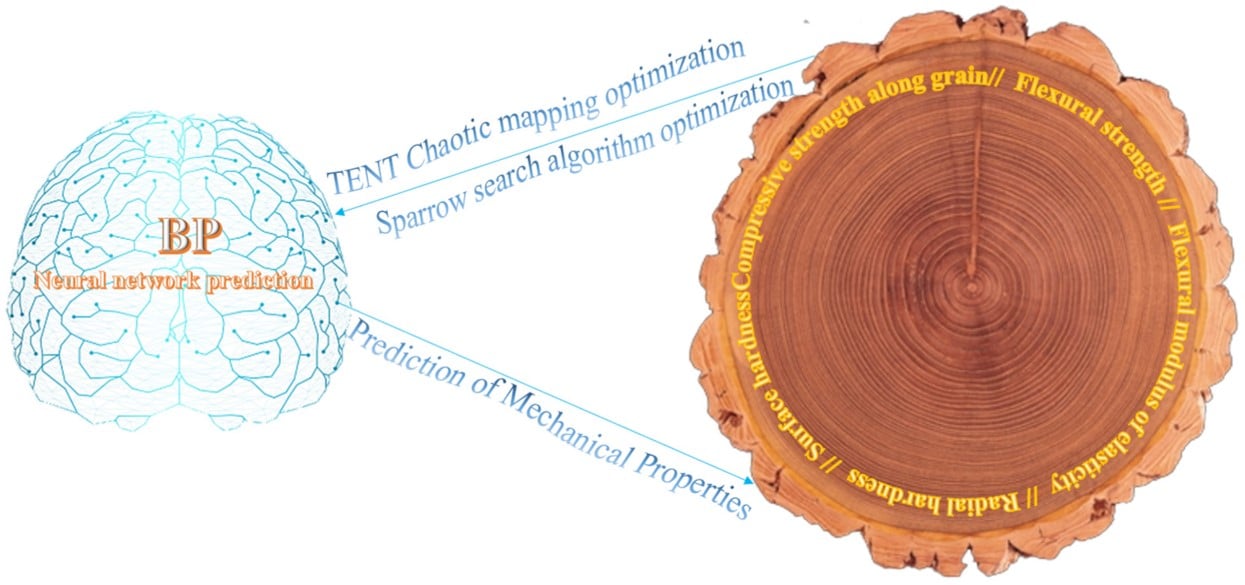
7. “The Current and Future Potential Geographical Distribution and Evolution Process of Catalpa bungei in China”
by Shengqi Jian, Tiansheng Zhu, Jiayi Wang and Denghua Yan
Forests 2022, 13(1), 96; https://doi.org/10.3390/f13010096
Available online: https://www.mdpi.com/1999-4907/13/1/96
Views: 1841; Abstract views: 1499; Citations: 8
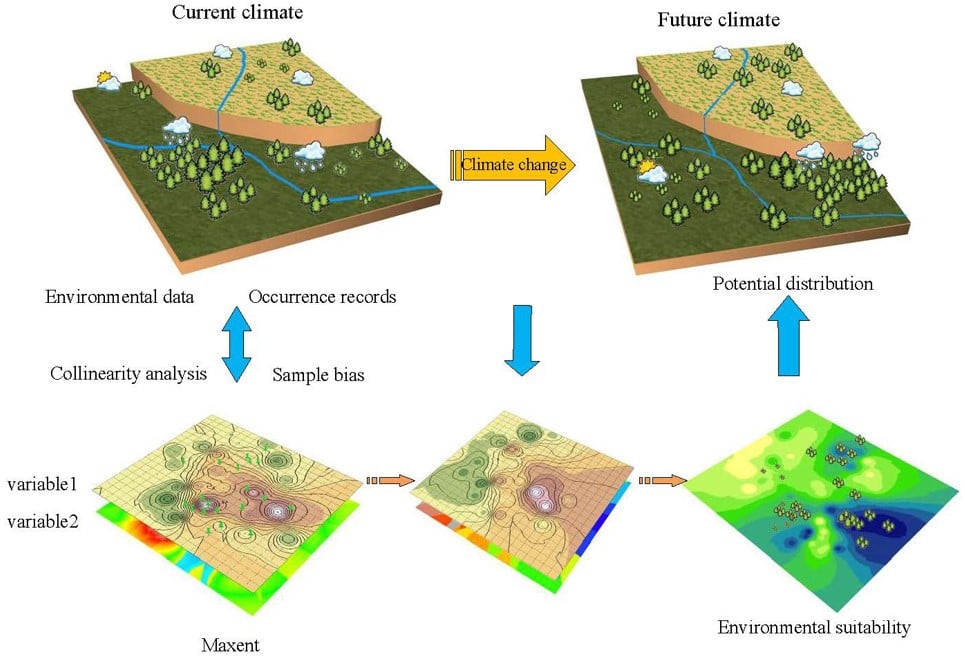
8. “n-Heptadecane-Impregnated Wood as a Potential Material for Energy-Saving Buildings”
by Ahmet Can and Jure Žigon
Forests 2022, 13(12), 2137; https://doi.org/10.3390/f13122137
Available online: https://www.mdpi.com/1999-4907/13/12/2137
Views: 1342; Abstract views: 1087; Citations: 8
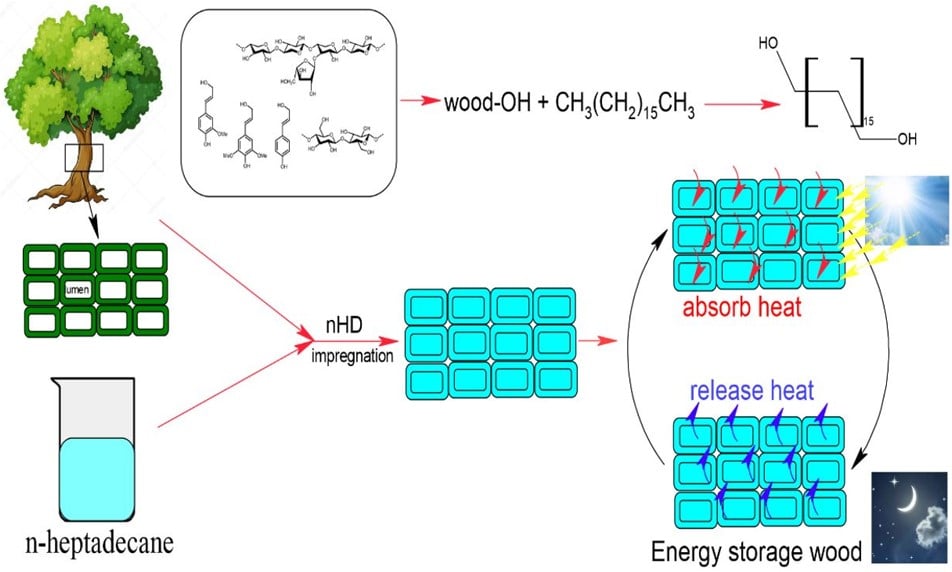
9. “Drivers of Flammability of Eucalyptus globulus Labill Leaves: Terpenes, Essential Oils, and Moisture Content”
by Fabián Guerrero, Camilo Carmona, Carla Hernández, Mario Toledo, Andrés Arriagada, Lorena Espinoza, Jan Bergmann, Lautaro Taborga, Karen Yañez, Yulián Carrasco et al.
Forests 2022, 13(6), 908; https://doi.org/10.3390/f13060908
Available online: https://www.mdpi.com/1999-4907/13/6/908
Views: 3764; Abstract views: 3281; Citations: 7
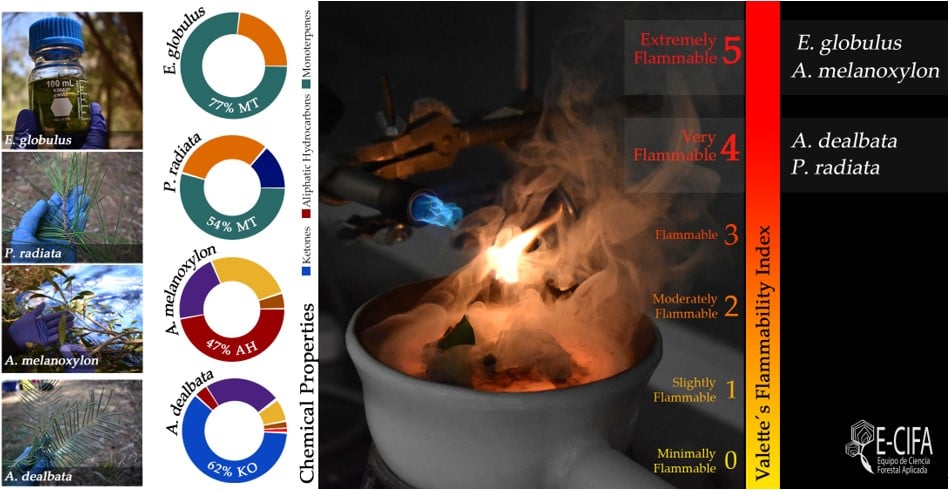
10. “Plant Diversity and Soil Nutrients in a Tropical Coastal Secondary Forest: Association Ordination and Sampling Year Differences”
by Muhammad Yaseen, Gaopan Fan, Xingcui Zhou, Wenxing Long and Guang Feng
Forests 2022, 13(3), 376; https://doi.org/10.3390/f13030376
Available online: https://www.mdpi.com/1999-4907/13/3/376
Views: 2942; Abstract views: 2194; Citations: 7
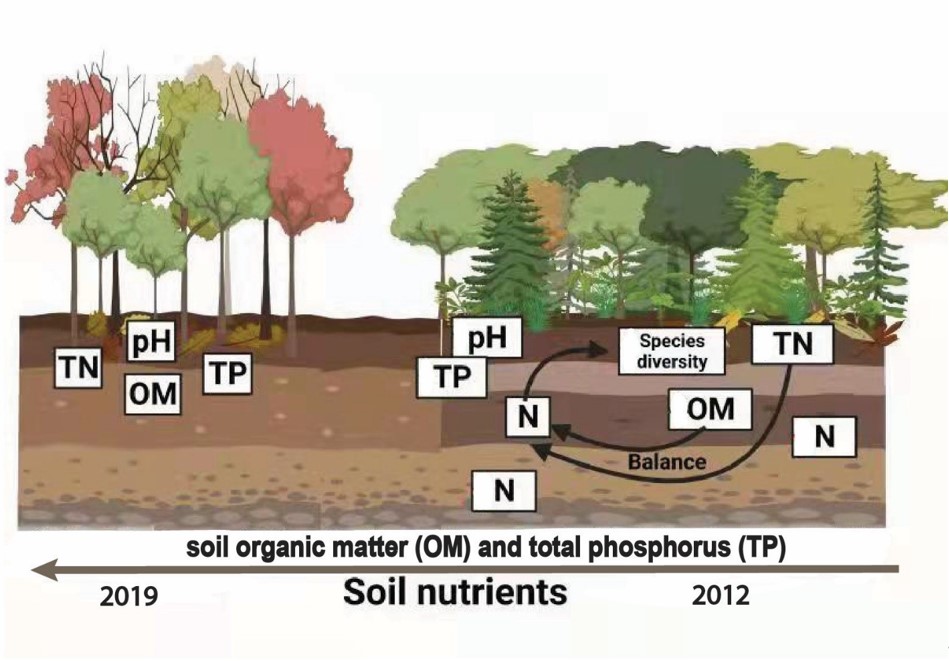
We would like to thank all the research groups behind these exceptional papers for their contributions to Forests. We would greatly appreciate it if you could circulate this document among your colleagues or through your network.
2 April 2024
Meet Us at the EGU General Assembly 2024, 14–19 April 2024, Vienna, Austria
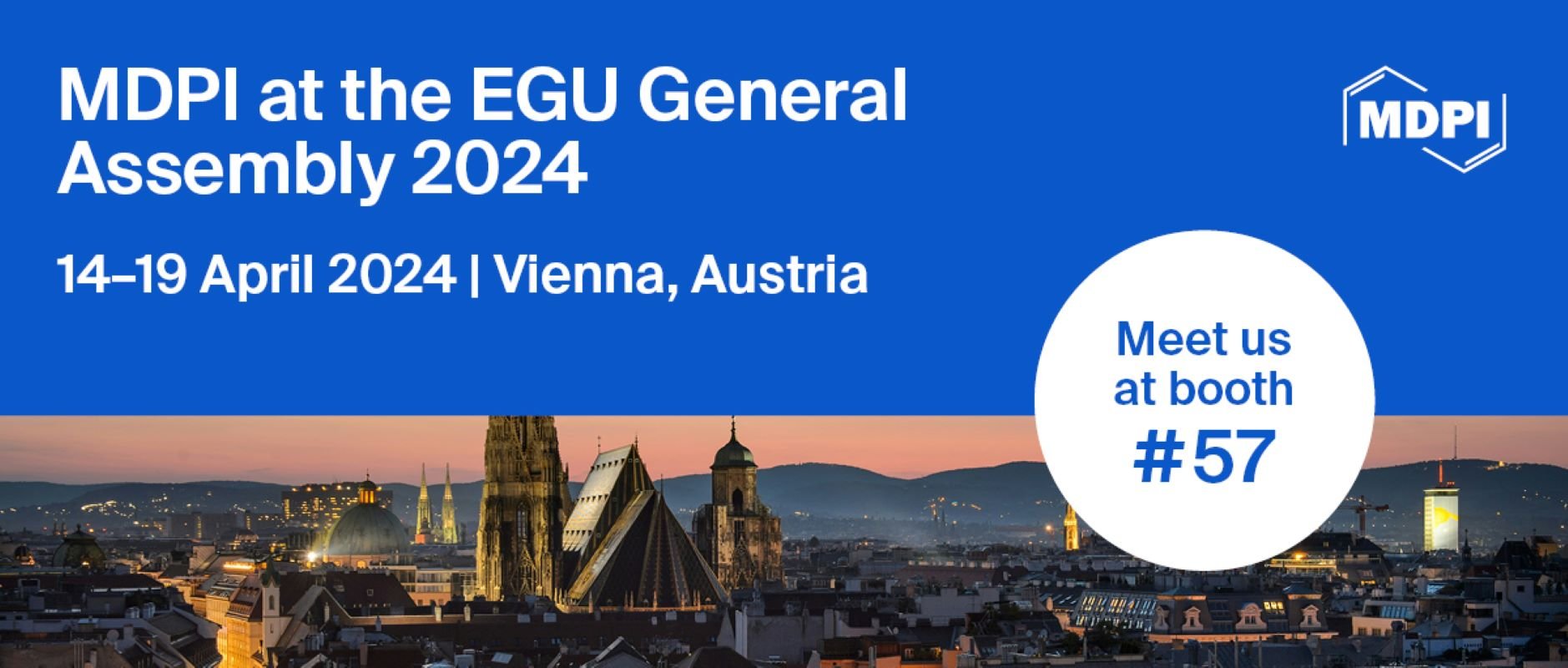
MDPI will be attending the EGU General Assembly 2024 in Vienna, Austria, which will take place from 14 to 19 April 2024 at booth #57. The EGU General Assembly 2024 is organized by the European Geosciences Union, and this is the 22nd conference. It brings together geoscientists from all over the world to one meeting covering all disciplines of the Earth, planetary, and space sciences. The EGU 2024 aims to provide a forum where scientists, especially early-career researchers, can present their work and discuss their ideas with experts in all fields of geoscience.
The following MDPI journals will be represented:
- Remote Sensing;
- Water;
- Hydrology;
- Meteorology;
- Sustainability;
- Atmosphere;
- Climate;
- Earth;
- Land;
- Minerals;
- Geographies;
- IJGI;
- Resources;
- Gases;
- Forests;
- Oceans;
- Quaternary;
- Geotechnics;
- Mining;
- Geomatics;
- Drones;
- Geosciences;
- Nitrogen;
- Soil Systems.
If you are attending the conference, please visit our booth. Our delegates look forward to meeting you in person and answering any questions that you may have. For more information about the conference, please visit the following website: https://www.aag.org/events/aag2024/.
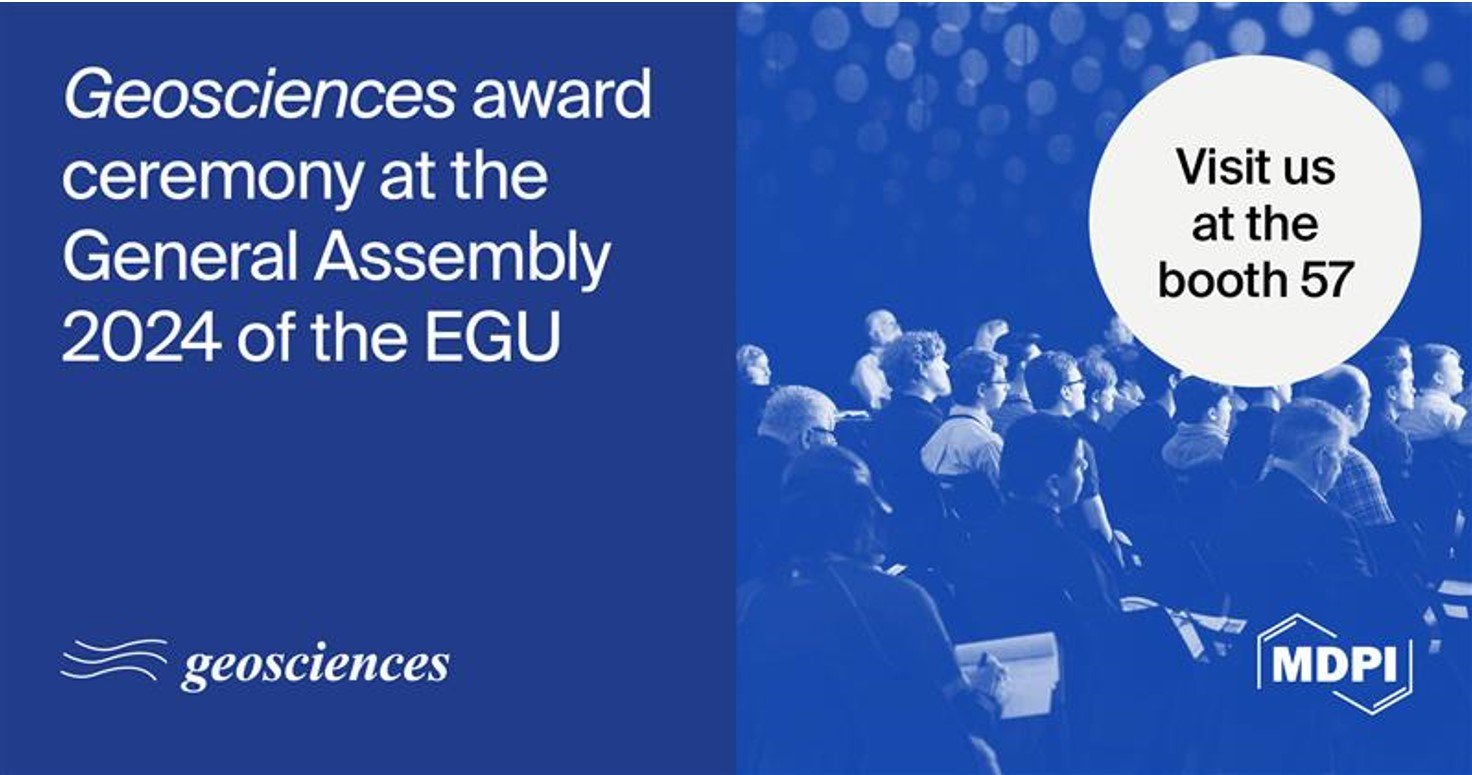
We would also like to congratulate the winners of the Geosciences 2024 Travel Award and the 2023 Outstanding Reviewer Award. Professor Olivier Lacombe, Section Editor-in-Chief of Geosciences, will present prizes on-site to Dr. Andrea Maffeis from Università di Torino, Dr. Simone Bello from University G. d’Annunzio, and Dr. Yuchen Wang from Japan Agency for Marine-Earth Science and Technology.
Join us on 16 April 2024 (17:30–17:45 CET) for the award ceremony at booth #57. If you are interested in travel support or learning about other MDPI awards, please visit our booth during the conference where our conference representatives will be available to assist you.
2 April 2024
MDPI Insights: The CEO's Letter #10 - South Korea, IWD, U2A, Japan

Welcome to the MDPI Insights: The CEO's Letter.
In these monthly letters, I will showcase two key aspects of our work at MDPI: our commitment to empowering researchers and our determination to facilitating open scientific exchange.
Opening Thoughts

Left to right: Dr. Jisuk Kang (Scientific Officer, MDPI), Stefan Tochev (CEO, MDPI), and Dr. Giulia Stefenelli (Chair of Scientific Office Board, MDPI), during media meetings at Prain Agency office in Seoul, South Korea.
Visit to Seoul, South Korea
During my recent visit to South Korea, I had the privilege of meeting various stakeholders, including representatives of government, research institutions, and academia, to understand their needs and communicate MDPI’s commitment to accessible science. Accompanied by my colleagues Dr. Giulia Stefenelli and Dr. Jisuk Kang, I engaged with the Korean scientific community, which is increasingly embracing open access (OA).
As the leading OA publisher in South Korea, MDPI is trusted by local authors and in 2023 enjoyed an approximately 30% share of the OA market. South Korea ranks sixth globally for MDPI in terms of research papers submitted and published.
MDPI and South Korea by Numbers
As at 30 March, over 76,000 MDPI articles have been authored by individuals affiliated with Korean institutions. We have over 1,800 active editorial board members (EBMs) from South Korea, with more than 880 EBMs having an H-index between 26 and 50, including 10 serving as Chief Editors.
“South Korea is the sixth-largest contributor to our total publications”
Over the past five years (2019–2023), nearly 120,000 authors affiliated with South Korean institutes have published with MDPI. Specifically in 2023, we received approximately 25,000 submissions from South Korean authors, publishing close to 13,000 articles, resulting in a rejection rate of 47.4%, which is not far below MDPI’s overall rejection rate of 56.4% in 2023.
Institutional Partnerships with South Korea
I am pleased to share that MDPI has more than 825 institutional partnerships worldwide, with 12 in South Korea, including Kyunghee University, Chung-Ang University, and Inha University, among others.

Left to right: Dr. Jisuk Kang (Scientific Officer, MDPI), Dr. Giulia Stefenelli (Chair of Scientific Office Board, MDPI), and Stefan Tochev (CEO, MDPI) fielding media questions at Prain PR Agency office in Seoul, South Korea.
Over the past three years (2021–2023), we have had some of the most prestigious academic universities ranked among the top 10 Korean institutions publishing with MDPI. Seoul National University had the highest number of publications with MDPI during those three years, publishing nearly 6,000 papers. Universities such as Korea University and Yonsei University also rank among the top 10 Korean institutions publishing with MDPI.
MDPI Hosts Seminar for Academia and Media
As the world’s leading OA publisher, MDPI is actively democratizing science. This is reflected in the seminars we hosted on 21 March to address questions about our editorial processes and ethical standards. The visit garnered media coverage, reflecting our mission to providing high-quality services and fostering open dialogue in the community.
“MDPI is actively democratizing science”
MDPI in the News

Stefan Tochev (CEO, MDPI) leading a seminar on OA and MDPI at Prain PR Agency office in Seoul, South Korea.
Media coverage generated by our visit to Seoul included the following stories:
“Open access is an unstoppable trend…it will lead the development of the knowledge ecosystem.”
I greatly appreciate the contributions of everyone who took the time to meet with us, share their stories, and hold us accountable for continuing to provide high-quality publishing services while identifying areas for improvement. I am also excited to announce that we have opened an MDPI office in Seoul and will release a press release on MDPI.com, with details, by the end April 2024. The purpose of the office is to establish a local presence to connect with and support the South Korean academic community through institutional partnerships, conferences, author workshops, stakeholder communications, and more.
Impactful Research

Featured Articles on Women’s Leadership and Healthcare
In celebration of International Women’s Day (8 March 2024), MDPI curated a collection of research articles on various topics, including women’s leadership, reproductive health, preventive healthcare, and a selection of articles from our journal Women.
Women’s Leadership
- Women Entrepreneurship and Sustainable Development: Bibliometric Analysis and Emerging Research Trends
Sustainability 2022, 14, 9160. https://doi.org/10.3390/su14159160 - Refugee Women Business Mentors: New Evidence for Women’s Empowerment
Sustainability 2022, 14, 9154. https://doi.org/10.3390/su14159154 - Women and Leadership in Higher Education: A Systematic Review
Soc. Sci. 2023, 12, 555. https://doi.org/10.3390/socsci12100555 - Understanding Needs and Potentials for Gender-Balanced Empowerment and Leadership in Climate Change Adaptation and Mitigation in Africa
Sustainability 2022, 14, 9410. https://doi.org/10.3390/su14159410 - Challenges Women Experience in Leadership Careers: An Integrative Review
Merits 2023, 3, 366-389. https://doi.org/10.3390/merits3020021
Women’s Reproductive Health
- Recreational Female Athletes’ Understanding of and Perceived Impact of the Menstrual Cycle on Physical Performance, Mood, and Sleeping Behaviour
Women 2023, 3, 445-456. https://doi.org/10.3390/women3030034 - Difficulties in Adaptation of the Mother and Newborn via Cesarean Section versus Natural Birth—A Narrative Review
Life 2023, 13, 300. https://doi.org/10.3390/life13020300 - The Main Theories on the Pathogenesis of Endometriosis
Int. J. Mol. Sci. 2023, 24, 4254. https://doi.org/10.3390/ijms24054254
Women’s Preventive Healthcare
- Insulin Metabolism in Polycystic Ovary Syndrome: Secretion, Signaling, and Clearance
Int. J. Mol. Sci. 2023, 24, 3140. https://doi.org/10.3390/ijms24043140 - Assessing Barriers Encountered by Women in Cervical Cancer Screening and Follow-Up Care in Urban Bolivia, Cochabamba
Healthcare 2022, 10, 1604. https://doi.org/10.3390/healthcare10091604 - Updates on HPV Vaccination
Diagnostics 2023, 13, 243. https://doi.org/10.3390/diagnostics13020243
Featured Articles in MDPI Journal Women
Below are a few articles from Women, our journal focused on women’s health, the social determinants of health, and the healthcare system that serves women. The aim of Women is to encourage academics to publish their experimental and theoretical results in detail, to aid reproducibility, and in an engaging style, to aid comprehensibility.
- Premenstrual Syndrome and Exercise: A Narrative Review
Women 2023, 3, 348-364. https://doi.org/10.3390/women3020026 - Increasing Awareness of the Human Papillomavirus (HPV) Vaccine for Women 18–45 Years of Age
Women 2023, 3, 365-373. https://doi.org/10.3390/women3030027 - Addressing Women’s Needs with Human Immunodeficiency Virus (HIV) and Enhancing the Visibility of Pharmacists in the Public Health Arena
Women 2022, 2, 346-352. https://doi.org/10.3390/women2040032
Inside MDPI

Championing Women’s Healthcare and Access to Healthcare Information
MDPI colleagues from our offices joined in celebrating #IWD2024. In doing so, we emphasized key missions that encompass:
- Empowering women to assume leadership and decision-making roles in both business and science.
- Helping women and girls make informed decisions about their health.
- Recruiting and developing female talent and fostering inclusive workplace environments.
“We are thrilled to recognize the accomplishments of women scientists”
I am proud to see our colleagues enthusiastically supporting the International Women’s Day call to ‘Inspire Inclusion!’ The heart-hands in the collage below symbolize our appreciation of the achievements of women researchers and the recognition of the trailblazers who have courageously made a mark on societies past and present.

We are thrilled to recognize the accomplishments of women scientists through our many MDPI awards and by highlighting success stories. As inspirational figures, female scientists are paving the way for the next generation of women aspiring to pursue careers in engineering, life sciences, computing, and various other STEM fields.
“I consider myself lucky because I work with incredibly talented women who inspire me every day.”
– Dr. Alessandra Pasut, Winner of MDPI's ‘Biology 2023 Young Investigator Award’
“It’s really important to find a supportive and enabling environment in which to do your science; it would have a big impact on you as a person and on your scientific outputs.”
– Dr. Rhea Longley, Winner of the ‘Pathogens 2023 Young Investigator Award’
Open-access publishing, in particular, allows early-career women researchers to share their work more widely, potentially attracting mentorship opportunities and collaborations. This support is crucial for career development and advancement.
Coming Together for Science

MDPI Joins United2Act in Collective Fight to Stop Paper Mills
In my February 2024 CEO Letter, I highlighted some of our recent initiatives aimed at bolstering our commitment to research integrity, including joining the STM Integrity Hub and expanding our Research Integrity and Publication Ethics team (RIPE). Continuing our efforts in coming together for science, I am pleased to share our participation in the United2Act initiative.
The text below is taken from our official announcement:
United2Act represents an international group of stakeholders in the publishing industry committed to addressing the collective challenge posed to research integrity by paper mills.
Scientists and academic publishers have increasingly noted the alarming proliferation of paper mills, recognized as fraudulent entities seeking to manipulate the publication process for financial profit. These entities engage in fraudulent practices such as falsifying or fabricating data, selling co-authorship of fake papers, manipulating peer review, and including inappropriate citations. These actions pose a significant threat to the integrity of the scholarly record, prompting widespread concern among those involved in the academic community.
MDPI has been actively contributing to combat the undermining of the scientific record. Our editors employ a set of tools to detect potential ethical breaches within a manuscript and to tackle the issue of fake papers.
United2Act’s consensus statement is the outcome of a virtual summit held in May 2023. It involved the participation of research bodies, publishers, researchers/sleuths, universities, and publishing infrastructure from 15 countries and resulted in a Consensus Statement outlining five key areas of action for all stakeholders:
- Education and awareness
- Improve post-publication corrections
- Facilitate and organise research on paper mills
- Enable the development of trust markers
- Facilitate dialogue between stakeholders
MDPI is committed to promoting transparency and integrity in scholarly publishing and is continuing to work closely with the scientific community toward this goal.
Closing Thoughts

Left to right: Ryo Hirayama (Marketing Specialist, MDPI), Takashi Sasabe (Marketing Specialist, MDPI), Dr. Giulia Stefenelli (Chair of Scientific Office Board, MDPI), Dr. Izumi Yamamoto (Marketing Manager, MDPI), and Stefan Tochev (CEO, MDPI), at MDPI’s office in Tokyo, Japan.
Visit to Tokyo and Kyoto, Japan
In March, I had the opportunity to visit our Tokyo office and engage with stakeholders in Tokyo and Kyoto. During the visit, I also recorded a video message to welcome Japanese scholars working with MDPI and to highlight our operations in Japan.
We held meetings with Editors-in-Chief, librarians, scholars, and external consultants to gather feedback on our efforts to enhance our reputation and explore additional steps we can take in that direction. Japan's rich cultural heritage, characterized by tradition, respect, and formality, provided valuable insights into meeting the publishing needs specific to Japan.
Japan’s Open Access statistics
Over the years, we have seen a shift from subscription-only to gold OA publishing in Japan, despite the lack of an official mandate. Here are some statistics:
- 2012: 68% of articles were subscription-only, 6% were green Open Access, and 8% were gold Open Access.
- 2016: 55% of articles were subscription-only, 6% were green Open Access, and 20% were gold Open Access.
- 2022: 43% of articles were subscription-only, 7% were green Open Access, and 39% were gold Open Access.
To learn more about the history of OA in Japan as well as about future trends, please read this blog post.
“Japan is the ninth-largest contributor to our total publications”

Left to right: Stefan Tochev (CEO, MDPI), Dr. Izumi Yamamoto (Marketing Manager, MDPI), and Dr. Giulia Stefenelli (Chair of Scientific Office Board, MDPI) visiting Kyoto University in Kyoto, Japan.
MDPI and Japan by Numbers
As at 1 April, over 50,000 MDPI articles have been authored by scholars affiliated with Japanese institutions, making the country the ninth-largest contributor to our total publications. Over the past three years (2020–2023), nearly 90,000 authors affiliated with Japanese institutes have published with MDPI, and we have collaborated with over 4,600 Guest Editors from Japan.
In 2023, we published over 8,200 papers from authors associated with Japanese institutions. MDPI collaborates with 41 institutional partnerships in Japan, including the University of Tokyo, Hokkaido University, and Nagoya University. We have over 2,100 active EBMs from Japan, more than 1,050 EBMs having an H-index between 26 and 50, including 13 serving as Editors-in-Chief.
General Feedback – a side note
A general takeaway from our discussions with stakeholders from around the world is that negative perceptions of MDPI often stem from misinformation, misconceptions, or misunderstandings about MDPI and our practices. While we acknowledge our mistakes and work diligently to address them, maintaining a strong editorial procedure and robust peer-review process, I find that educating stakeholders about our how we do what we do and our ongoing improvements tends to help shift opinions.
That said, we recognize the importance of addressing individual concerns. We take feedback seriously and are continuously working to get better while not compromising the core principles that millions of authors appreciate about MDPI.
Chief Executive Officer
MDPI AG
14 March 2024
Prof. Dr. Giacomo Alessandro Gerosa Appointed Editor-in-Chief of Forests
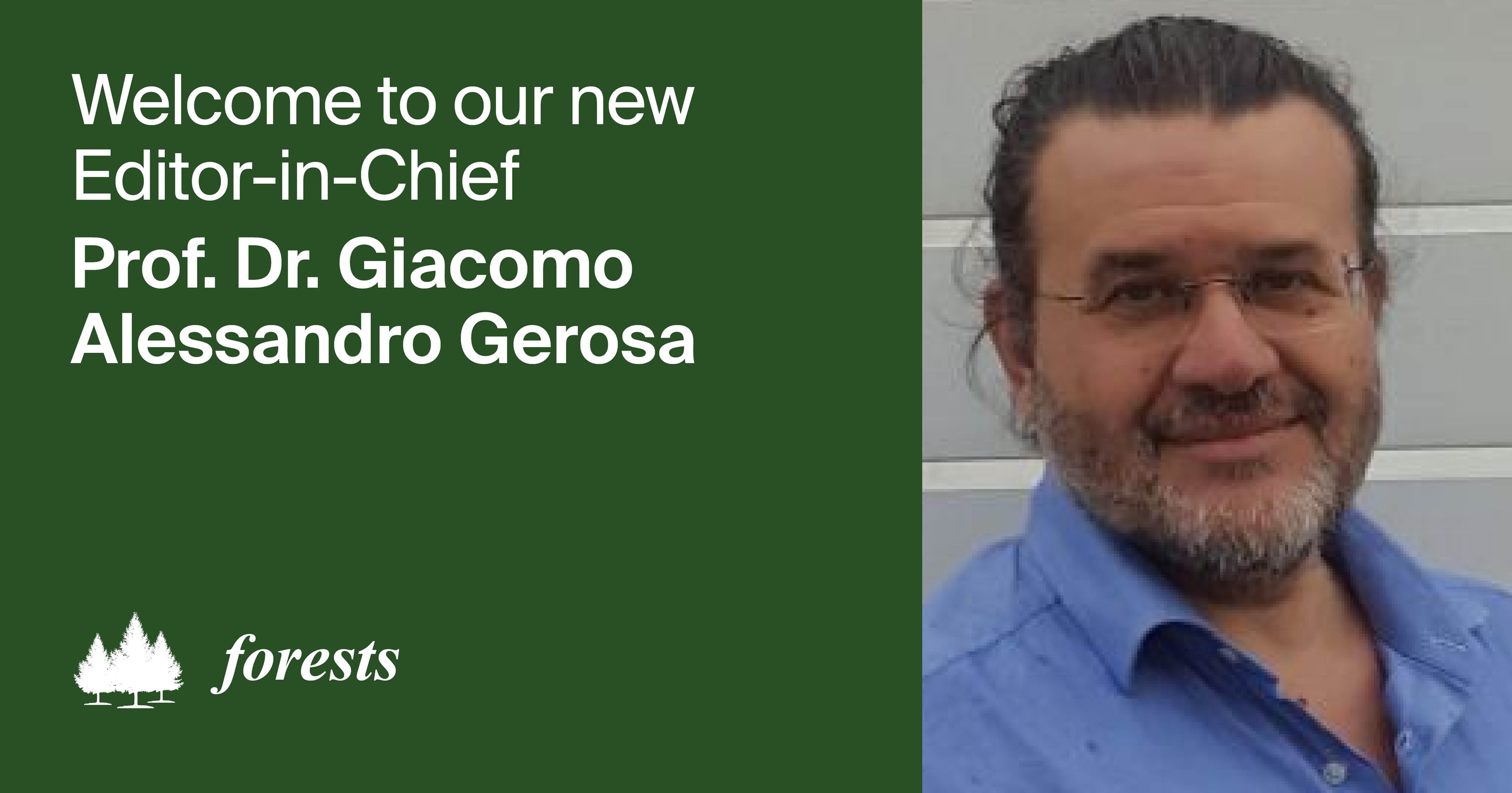
We are pleased to announce that Prof. Dr. Giacomo Alessandro Gerosa has been appointed Editor-in-Chief of our journal Forests (ISSN: 1999-4907). With an extensive background in scientific research and publishing, he brings a wealth of knowledge and expertise to this role.
The following is an interview with Prof. Dr. Giacomo Alessandro Gerosa, who shared his academic background, his involvement with Forests, and his vision for the journal:
1. Could you please tell us a little bit about yourself and your academic background and what are your current interests?
I received an M.Sc. in environmental sciences and then a Ph.D. in agricultural ecology with a research focus on ozone fluxes in agricultural and forest ecosystems. After the Ph.D., I worked for 15 years as a researcher at the Università Cattolica del Sacro Cuore, Italy, dealing with ecophysiology and the effects of air pollutants on plants. Once employed at the Italian National Scientific Habilitation as a professor of ecology, agricultural chemistry, and physics of the earth system, I was appointed associate professor of the latter subject by the Catholic University of Brescia, Italy. Then, following the second habilitation as full professor, I was promoted to my current position as a full professor of physics of the earth system, and was in charge of teaching micrometeorology, atmospheric physics, and ecology.
Even though my academic career may seem quite heretical for a forest scientist, I have worked with forests and forest trees. At the beginning, my research was aimed at studying the effects of air pollution on single forest trees, by means of fumigations and experiments in a controlled environment. Then, my interests turned to nature and forest ecosystems as a whole, particularly to monitor their matter exchange with the atmosphere. Measurements were taken in the Mediterranean holm oak forests, Mediterranean shrub maquis, Alpine larix forests, oak-hornbeam plain forests, both in Italy and in Europe, as well as in poplar plantations. I made significant contributions with these measurements and analyses to different national and European forest monitoring programs.
My current research interests are the detailed characterization of the exchange processes of matter and energy between the atmosphere and ecosystems, with particular regards to the forests, both from an experimental and a modelist perspective. My current field work consists of the installation of micrometeorological towers in forest ecosystems to measure the vertical fluxes of many matter compounds, relating them with climate, plant, and soil parameters. My collaborators and I manage an ICOS (Integrated Carbon Observation System)-associated forest site in Northern Italy, where fluxes of carbon dioxide, water, ozone, nitrogen oxides, and particles are continuously measured. Our effort is to obtain as long a time series of measurements as possible in order to assess the interannual variation of fluxes and to calibrate models. An 11-year long series is already available for the ozone, water, and carbon dioxide.
2. Which research topics do you think will be of particular interest to the research community in the coming years?
My answer is influenced by my interests. However, I think that the assessment of the combined effects of climate change and air pollution on forest ecosystems will be of paramount importance in the future, along with the studies of the best adaptation strategies. This could be addressed with experimental research in the field or in a controlled environment and by developing coupled land–atmosphere models as mechanistically as possible. The dynamics of different carbon sinks and sources in forests should be fully elucidated, along with their interactions with nutrient cycles such as nitrogen. Projections about the future are necessary, and forest scientists and ecologists will need to interact much more closely with atmospheric scientists in the near future. The spread of the IoT (Internet of Things) will allow for the more extensive, dense, and economical monitoring of forest ecosystems, and the same applies to UAV and satellite measurements. Interdisciplinarity could be a good strategy to push the limits of knowledge in forestry research.
3. As the Editor-in-Chief, what are your thoughts on the journal Forests, and what expectations do you have for the future?
The journal Forests has significantly increased its impact factor in recent years and has acquired a good reputation in the forest-related research community. Currently, it is ranked Q1 in forestry research. It is important to maintain and enhance this reputation in the future through the promotion and selection of the most innovative and high-quality research, thus increasing the number of external citations per article.
4. In your opinion, what can authors expect when they submit to Forests?
Authors can expect fair and rigorous reviews of their work, along with a rapid evaluation process. In my opinion, these are the benefits of this journal. Moreover, they have the opportunity to publish in an open-access journal of good reputation and IF.
We wish Prof. Dr. Giacomo Alessandro Gerosa every success in his new position as the Editor-in-Chief, and we greatly look forward to his contributions.
14 March 2024
Prof. Dr. Lei Deng Appointed Section Editor-in-Chief of Section “Forest Soil” in Forests

We are pleased to announce that Prof. Dr. Lei Deng, a professor at the Institute of Soil and Water Conservation, Chinese Academy of Sciences, China, has been appointed Section Editor-in-Chief of the Section “Forest Soil” in Forests (ISSN: 1999-4907).
The following is a short Q&A with Prof. Dr. Lei Deng, who shared his vision for the journal with us, as well as his views of the research area and open access publishing:
1. Can you please give a brief introduction of yourself to the readers?
I am mainly focused on the effects of vegetation restoration on soil carbon budgets. I have been conducting research in this field for 15 years. During this process, I established the evaluation method of the carbon sequestration benefit of China’s “Grain for Green” project and predicted the carbon sequestration potential of the project. At the same time, I explored the dynamic evolution process of soil carbon sequestration and its stabilization time following vegetation restoration and conducted research on the driving mechanism of soil carbon sequestration by plants, soil, and microorganisms. I have achieved a series of research results. At present, I have published more than 100 SCI-indexed papers in PNAS, Global Change Biology, Soil Biology & Biochemistry and other journals.
2. What attracted you to scientific editing for Forests?
Forestry research has been booming in recent years, especially in China, where the number, depth, and influence of innovative achievements are increasing. The Forests journal is a good carrier for solving important frontier problems in forestry research. I am delighted to have this opportunity to contribute to its development. I am full of hope and enthusiasm for its prospects and firmly believe that Forests can become an open-source archive of world-class academic achievements, a highly trusted source of innovative information and technology, and a new platform for academic exchange and knowledge dissemination in forests and related disciplines around the world.
3. Which research topics do you think will be of particular interest to the research community in the coming years?
Global climate change and human activities have always been important factors affecting the development of forest health, so in the next few years, I think the research in the field of forestry research will still be inseparable from these two aspects. Specifically, the impacts of land use change, forest management, climate change, N subsidence, and even various disasters and forest protection on forest structure and function will remain the focus of forestry research. In addition, the biological and abiotic driving mechanisms of these changes should be analyzed in detail.
4. What advice would you offer to a new editor of a journal?
I have three pieces of advice for new editors. First, adhere to lifelong learning and improve your knowledge reserve and skill level. Second, actively participate in academic exchanges and other social welfare activities to improve your comprehensive service capabilities and industry influence. Third is to undertake the due responsibilities of the Editorial Board, strictly regarding manuscripts, and put forward good suggestions for the development of the journal.
5. Forests is an open access journal. How do you think open access impacts authors?
Open access is conducive to the dissemination of papers and can result in more people seeing the papers published. I think it is a great business model.
We wish him every success in his new position, and we look forward to his contributions to the journal.
4 March 2024
MDPI Insights: The CEO's Letter #9 - Romania, Research Integrity, Viruses

Welcome to the MDPI Insights: The CEO's Letter.
In these monthly letters, I will showcase two key aspects of our work at MDPI: our commitment to empowering researchers and our determination to facilitating open scientific exchange.
Opening Thoughts

Reka Kovacs (Deputy Office Manager, MDPI), Stefan Tochev (CEO, MDPI), and Sandra Ana Spatariu (Office Manager, MDPI) at the MDPI office in Cluj, Romania.
MDPI’s Impact on Romania
In February, I visited our office in Cluj, Romania. I worked closely with our senior office managers and various teams, including the departments of training, marketing and conferences, as well as our journal relationship specialists, reviewing our service to the local scholarly community. During the visit, I also met with representatives from Babes-Bolyai University and the Technical University of Cluj-Napoca. Our multifunctional Romanian office plays an important role in supporting our collaborations with the local market as well as helping to meet MDPI’s overall business needs.

Feedback and strategy meeting with a group of MDPI’s Journal Relationship Specialists at the MDPI office in Cluj, Romania.
With 22,436 articles, Romania ranks as a top 20 contributing country to MDPI’s total number of papers published as at 28 February 2024. This highlights the importance of our collaboration with Romanian-affiliated authors and the growing opportunity to support their publishing needs. MDPI is one of the few academic publishers with a significant presence in Romania, boasting over 360 colleagues across our offices in Bucharest and Cluj. We are also proud to hire colleagues from local institutions to launch their careers within publishing.
Romania ranks as a top 20 contributing country.
The Numbers: 2019–2023
MDPI has seen a healthy increase in submissions from Romanian authors over the past three years, from 8,439 in 2021 to 11,866 by end of 2023, with most submissions going to journals such as Sustainability, Medicina, Diagnostics, IJMS, Applied Sciences, and JCM. From 2019 to 2023, MDPI published articles from 32,145 authors affiliated with Romanian institutions. Over those years, we have worked with Romanian Guest Editors on nearly 3,000 occasions to support their Special Issue and Topical collections.
With more than 300 Editorial Board Members from Romania, 34 appear on the board of Mathematics, 27 on Materials, 19 on Polymers, 18 on Coatings, and 16 on Molecules, while three serve as Section Editors-in-Chief (SEiC) on our journals Coatings (3.4 IF, 4.6 Citescore), Magnetochemistry (2.7 IF, 3.5 Citescore), and Chemosensors (4.2 IF, 3.9 Citescore).
Institutional Open Access Programs
Our commitment to working with institutions is evident in Romania, where we have established eight Institutional Open Access Programs (IOAP) with esteemed institutions such as the University of Bucharest, the University of Medicine and Pharmacy Cluj-Napoca, and most recently the National Institute for Laser, Plasma and Radiation Physics.
Our growth and presence in Romania are a true testament.
We also have IOAP agreements with Babes-Bolyai University and the Technical University of Cluj-Napoca, where I had the opportunity to meet senior stakeholders during my visit. Below are a few photos capturing our meeting with Prof. Radu Silaghi-Dumitrescu (Head of Faculty of Chemistry, Babes-Bolyai University) at the MDPI office in Cluj, Romania, along with a photo from our meeting with Vice Deans Nicoleta Cobarzan, Nicoleta Ilies, and Hoda Gavril, from the faculty of Civil Engineering at the Technical University of Cluj, Romania.


Our growth and presence in Romania are a true testament to the service we provide to the scholarly community and the relationships we foster in that region. We look forward to continuing to support Romanian scholars and institutions by providing a valuable and trusted experience with MDPI, the leader in open access publishing.
Impactful Research

MDPI Joins the STM Integrity Hub
MDPI has long been a supporter and partner of STM, with our involvement ranging from sponsoring and attending events to helping organize event programs. By joining the STM Integrity Hub, we aim to further our commitment to STM initiatives aimed at safeguarding the integrity of science.
“We are pleased to welcome MDPI as the 35th organisation participating in the Hub. This expansion is critical, as every new member enhances our capacity to prevent fraudulent submissions from entering the academic record.”
Joris van Rossum, Director of Research Integrity, STM
MDPI operates in full alignment with STM Integrity Hub's values of shared data and experiences. We strongly believe in collaboration and open exchange for the purposes of creating a holistic approach to support research integrity at MDPI itself and across the entire academic publishing industry. The Integrity Hub is an excellent example of how publishers can come together to jointly address industry-wide challenges related to research integrity, such as manuscripts that breach research integrity standards and paper-mills.
I look forward to our Research Integrity and Publication Ethics Team (RIPE) team immersing themselves in this initiative, exchanging information, best practices, and tools for the benefit of the entire scholarly ecosystem. We believe that ethical publishing standards should be implemented across the board, and we aim to be rigorous in our approach, addressing research integrity issues and improving the impact of published research.
Inside MDPI

MDPI Expands Research Integrity and Publication Ethics Team (RIPE)
In addition to external collaborations and joint initiatives aimed at further strengthening our commitment to research integrity, we are also enhancing our internal efforts. This includes improving our processes and guidelines and expanding our teams and departments to ensure quality assurance throughout our publishing process.
We are pleased to announce the expansion of our Research Integrity and Publication Ethics Team (RIPE) at MDPI. The RIPE team has recently welcomed new colleagues, each bringing unique skills and a personal commitment to prioritize ethical considerations in all our work.
The demand for research integrity and high ethical standards in academic publishing is steadily rising across our industry. Our expanded RIPE team will work to enhance and align our practices with industry best practices, ensuring excellence in research integrity and publication ethics.

Stefan Tochev (CEO, MDPI) introduces Dr. Tim Tait-Jamieson (Research Integrity Lead, MDPI) for his presentation on MDPI’s Retraction and Approval Process to a group of Journal Relationship Specialists at the MDPI office in Cluj, Romania: “The demand for research integrity and publication ethics is steadily rising across our industry.”
Introducing our Research Integrity and Publication Ethics Team
Led by Dr. Tim Tait-Jamieson (Research Integrity Lead), the RIPE team comprises Dr. Ivana Resanovic (Research Integrity Manager), Dr. Lavinia Rogojina (Research Integrity Manager), Ms. Diana Apodaritei (Research Integrity Specialist), Dr. Zoltan Mihaly (Research Integrity Specialist), Mr. Aleksandar Đukić (Research Integrity Specialist), Ms. Ana Stankovic (Research Integrity Specialist), and Ms. Anna Pena (Publication Ethics Assistant).
Please click here to access everything that you need to know about MDPI’s Research and Publication Ethics.
With this span of complementary roles, the RIPE team collaborates directly with journal editorial teams and works closely with various departments, including our Scientific Office Board and our Journal Relationship Specialists. The team’s primary objectives are to help prevent issues regarding research integrity and publication ethics during peer review, uphold MDPI’s ethics policies, adhere to industry standards, and resolve publication ethics and research integrity issues and complaints.
Quality Updates to Special Issues Oversight
At MDPI, we are committed to reviewing policies pertaining to the quality of research. In this blog post, Shaheena Patel (Communications Associate, MDPI), outlines two recent updates to MDPI journal processes. These updates pertain to Special Issue (SI) quality guidelines, in line with criteria provided by COPE and DOAJ. Alongside the SI updates, details regarding the new minor corrections policy introduced in 2024 are provided in the blog.
The two updates we implemented include greater oversight and the verification of Guest Editor credentials. These guidelines require that Editors-in-Chief (EiCs) and Editorial Board Members (EBMs) take responsibility for overseeing SIs.
PS. Thank you, James Butcher, for featuring this up in your 67th issue of the Journalogy newsletter.
Read more:
Coming Together for Science

Viruses 2024 – A World of Viruses
I am pleased to share the success of our MDPI conference Viruses 2024 – A World of Viruses, held 14-16 February, in Barcelona. With 240 registrations, this event brought together top scientists, researchers, and industry experts from 40 countries to share their findings on the latest developments in viral pathogenesis and immune responses.
Attendees gathered for the 5th edition of the Viruses’ conference, where we hosted influential keynote speeches from Nobel Prize laureate Dr. Charles M. Rice and ‘Distinguished Senior Virologist’ Prof. Luis Enjuanes, along with 14 invited speakers, 47 selected speakers, and nine flash poster presenters, to discuss the most significant issues in virology today.
Recap on the #Viruses2024 Conference
Take a look at the key moments from MDPI’s Viruses event and please join us in commemorating a gathering for global knowledge and cooperation. A heartfelt thank-you to all attendees; their passion and engagement played a crucial role in making this event an engaging success!
Below are calls to action from the keynote speakers encouraging collaboration and communication:
“There’s never been a better time than now to really take the power that we have both in terms of basic research and also in biotech and pharma to develop antiviral agents.” - Dr. Charles M. Rice, The Rockefeller University, New York, USA
“The collaboration between labs is absolutely essential. Improving initial detection and improving communication is a must for all of us working in science.” - Prof. Dr. Luis Enjuanes, National Center of Biotechnology (CNB-CSIC), Madrid, Spain

Our thanks go to our sponsors and partnering societies, our Viruses journal and editorial team, our Barcelona colleagues, and the social media, conference and other MDPI teams for making this event a memorable occasion. View the event gallery here.
Upcoming In-Person Event

24–26 April, 2024
4th MMCS – Harnessing the Power of New Drug Modalities
Location: Barcelona, Spain
Esteemed speakers at MMCS 2024 include Prof. Arun K. Ghosh, the mind behind the Darunavir molecule, and Prof. Paul Brennan, CSO of Alzheimer's Research UK Oxford Drug Discovery Institute.
Find more upcoming MDPI events here.
Organize Your Event with MDPI’s Sciforum
Sciforum is MDPI’s platform dedicated to the organization of scientific events. In line with our mission to promote science, Sciforum supports scholars, societies, research networks, and universities at all stages of organizing in-person events, virtual events and webinars. Our platforms are efficient, user-friendly, and cost-effective. We handle all steps related to event management. Contact us for details.
Closing Thoughts

Researcher to Reader (R2R) Conference
From 20–21 February 2024, I had the pleasure of attending the Researcher to Reader (R2R) conference in London, which MDPI has proudly sponsored over the years. The conference programme offered a variety of session formats, including workshops, panel discussions, debates, interviews, presentations, and lightning talks, with opportunities to discuss relevant topics.
We take pride in supporting the scientific community, bringing researchers across the world together to network, exchange ideas and share the latest in science and publishing. In 2023, MDPI invested close to 2 million CHF in sponsoring over 2,000 scientific and publishing-related conferences worldwide.
R2R Peer Review Innovations Workshop
I found the R2R conference to be engaging, with the workshops being particularly enjoyable. My colleague Giulia Stefenelli (Chair of Scientific Office Board) and I participated in the “Peer Review Innovations” workshop, which spanned four sessions over the two days. These sessions explored the future of peer review and how we can improve the peer review process for everyone involved. Notably, the large majority of attendees expressed their opinion that peer review, as currently practiced, requires significant improvement. Together, we collaborated on potential immediate and long-term improvements and innovative processes, aiming to create an ecosystem beneficial to all stakeholders by strengthening submission systems with the aim of reducing threats and making authors more responsible for their work. We also discussed the opportunity for academic institutions to better scrutinize the quality of the work produced and submitted to journals.
Our group comprised publishers, software providers, librarians, and more, bringing diverse perspectives to the discussions. These interactions were relevant to MDPI’s ongoing conversations, providing insights to our efforts. The session also made me appreciate that MDPI is doing well, as the group discussions included the subject of various quality checks that we have already embedded in our processes, ensuring that we keep abreast of industry standards.
The need for an optimized system to incentivize the activities of editors and reviewers was also a focus of discussion, as well as the support that reviewers need from publishers via the provision of strong reports through fixed forms, questionnaires and training.
At MDPI, we are currently auditing our reviewer program to improve reviewer recognition, guidelines, and methods for identifying suitable reviewers, while maintaining our commitment to quality and timeliness.
Congratulations to Mark Carden, Conference Director, and the R2R team for organizing a productive and successful event. PS: The break times were greatly appreciated as well!
Chief Executive Officer
MDPI AG
26 February 2024
Meet Us Online at the MDPI World Wildlife Day Webinar 2024, 1 March 2024
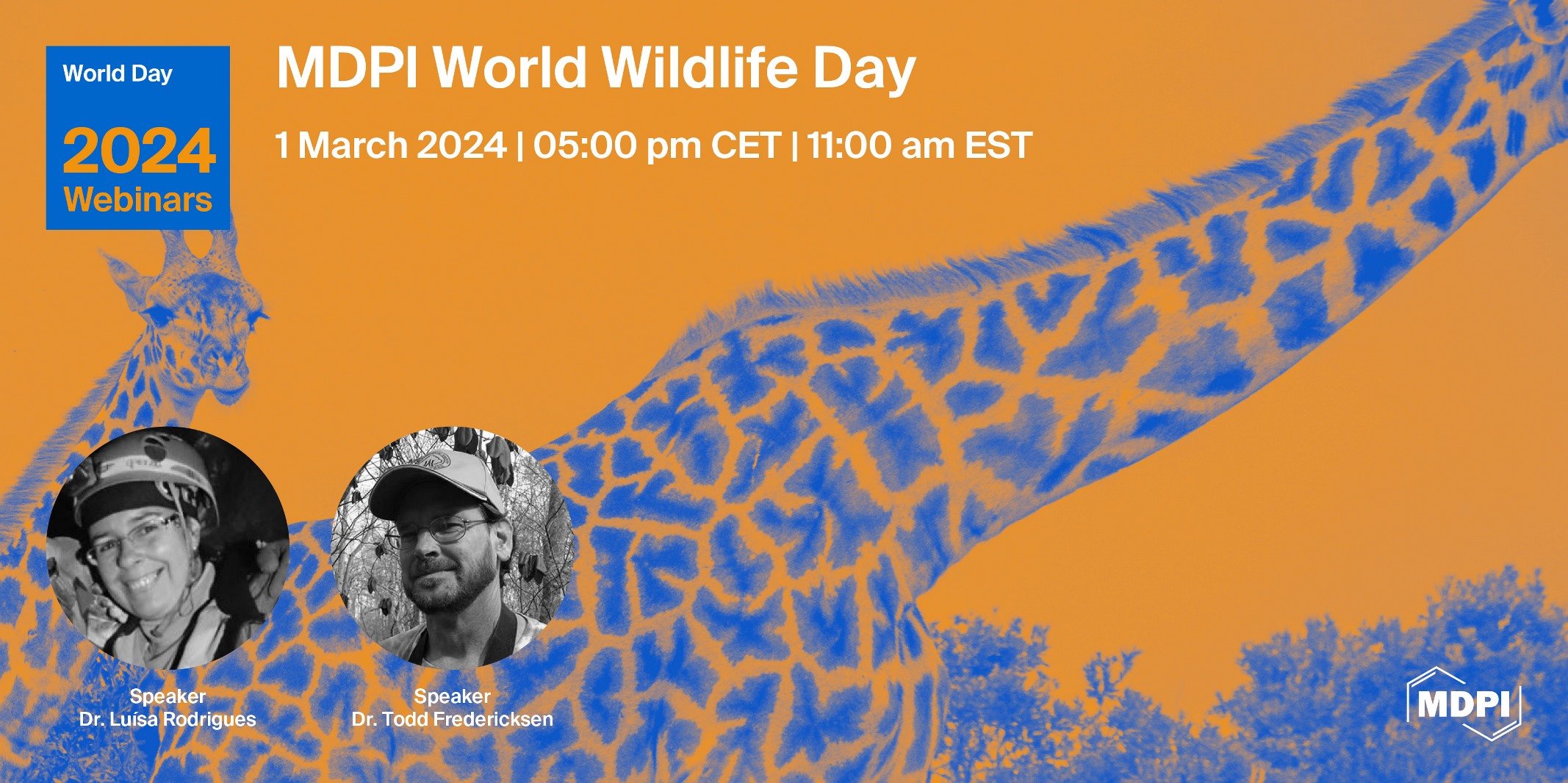
MDPI would like to invite all experts recognized in their fields to attend the MDPI World Wildlife Day Webinar 2024. The aim of this webinar is to encourage scientists to come together, take action, and raise awareness as to how the exchange of findings facilitates efforts towards wildlife conservation.
Conference: MDPI World Wildlife Day Webinar 2024
Date: 1 March 2024
Time: 5:00 p.m.–6:30 p.m. (CET)
To register in advance for this workshop, please click here.
After registering, you will receive a confirmation email containing information on how to join the workshop. The number of participants able to join the workshop is limited; however, a recording will be made available online shortly afterwards. Registrations with academic institutional email addresses will be prioritized.
Workshop Speakers:
Name: Dr. Luísa Rodrigues
Affiliation: Portuguese Institute for the Conservation of Nature and Forests, Portugal
Presentation theme: “The Importance of Knowledge Sharing: 36 Years of Bat Conservation in Portugal”
Name: Dr. Todd Fredericksen
Affiliation: Ferrum College, Virginia, USA
Presentation theme: “A Case Study on a Long-Lived Turtle: Terrestrial Species in Eastern North America - the Woodland Box Turtle”
We are pleased to provide this excellent opportunity to all outstanding researchers in their fields, to propose and develop new approaches, exchange perspectives, and encourage new lines of research.
To find out more about the speakers and the program, please visit https://sciforum.net/event/MWWDW24. We hope that you are able to join us for this event.
MDPI Webinar Secretariat



